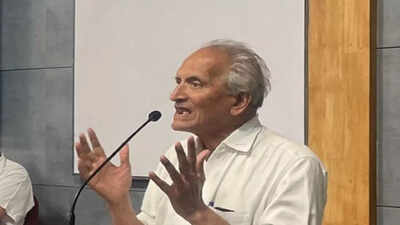- News
- City News
- mangaluru News
- Sacred texts of various faiths advocate accountability: Professor VK Tripathi
Trending Topics
Sacred texts of various faiths advocate accountability: Professor VK Tripathi

Professor VK Tripathi delivers a lecture on ‘Science and Freedom’, at St Aloysius College in Mangaluru.
MANGALURU: Sacred texts of various faiths advocate accountability. We must take responsibility for our actions and refrain from doing anything that would cause harm to others, said Professor VK Tripathi, former professor at IIT-Delhi.
Tripathi was delivering a special lecture on ‘Science and Freedom’, at St Aloysius College in Mangaluru, on Tuesday.
It was organized by The Nehru Study Centre, Mangalore University, in collaboration with the department of political science, St Aloysius College.
Tripathi laid down the significance of open-mindedness in exploring ideas in the light of humans becoming slaves of their own thinking.
He gave a timeline of modern science— from Newton’s Law of Motion in 1686 to the invention of the steam engine in 1776. He spoke on how the steam engine led to the emergence of textile mills, and he made a mention of the four essential things a machine required— iron, coal, raw materials, and markets.
He referred to historian Adam Jones’s book ‘The Genocide: An Extended Introduction’, where the author makes an interesting observation that India hadn’t experienced famines for around three centuries prior to British imperialism. He mentioned how the British gained political and administrative control over the country after the Battle of Plassey in 1757.
With this, they established their textile mills in the country and brought about the ruin of the Indian textile mills, which once topped the world market. This indicated how science became an instrument of oppression and hunger. "Science was used to further political motives and vested interests; it soon became an instrument of slavery," he said.
Tripathi was delivering a special lecture on ‘Science and Freedom’, at St Aloysius College in Mangaluru, on Tuesday.
It was organized by The Nehru Study Centre, Mangalore University, in collaboration with the department of political science, St Aloysius College.
Tripathi laid down the significance of open-mindedness in exploring ideas in the light of humans becoming slaves of their own thinking.
He gave a timeline of modern science— from Newton’s Law of Motion in 1686 to the invention of the steam engine in 1776. He spoke on how the steam engine led to the emergence of textile mills, and he made a mention of the four essential things a machine required— iron, coal, raw materials, and markets.
He referred to historian Adam Jones’s book ‘The Genocide: An Extended Introduction’, where the author makes an interesting observation that India hadn’t experienced famines for around three centuries prior to British imperialism. He mentioned how the British gained political and administrative control over the country after the Battle of Plassey in 1757.
With this, they established their textile mills in the country and brought about the ruin of the Indian textile mills, which once topped the world market. This indicated how science became an instrument of oppression and hunger. "Science was used to further political motives and vested interests; it soon became an instrument of slavery," he said.

About the Author
Kevin MendonsaHe has over a decade of experience in writing, reporting, and editing for print media. He is working with The Times of India as a senior correspondent (senior digital content creator) from 2015. He covers education, crime, aviation, lifestyle and other subjects.
Start a Conversation
FOLLOW US ON SOCIAL MEDIA
FacebookTwitterInstagramKOO APPYOUTUBE









